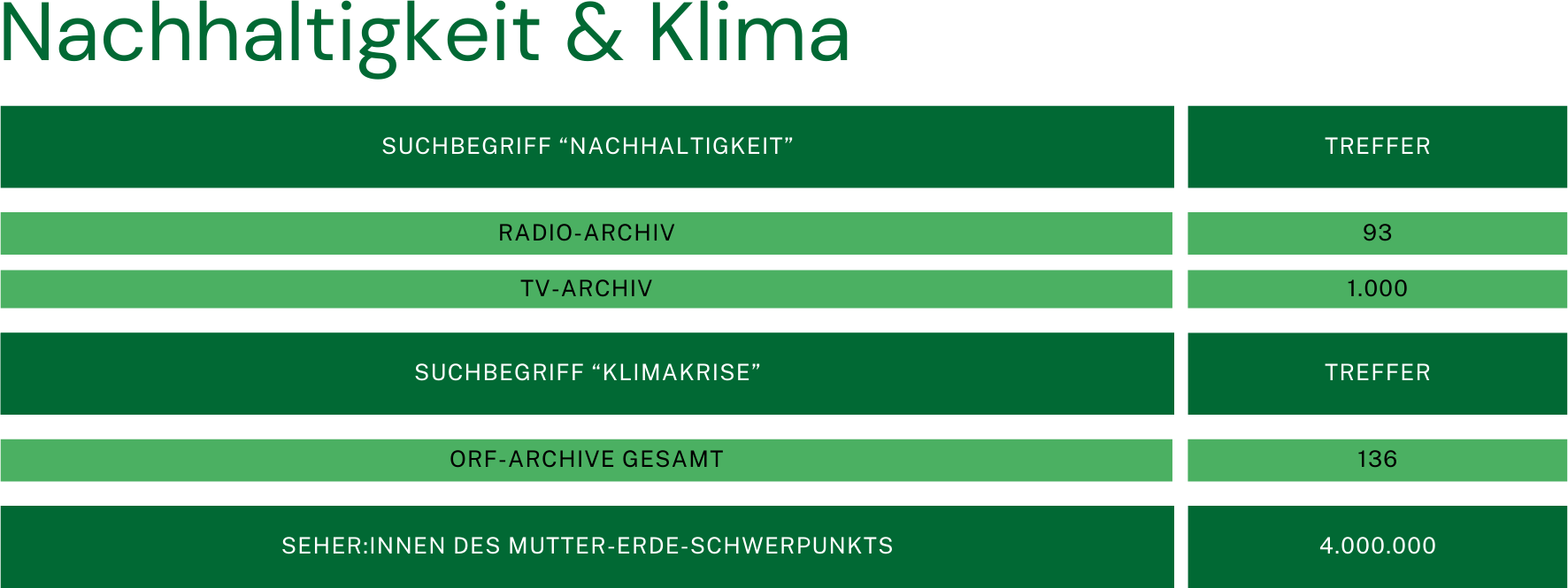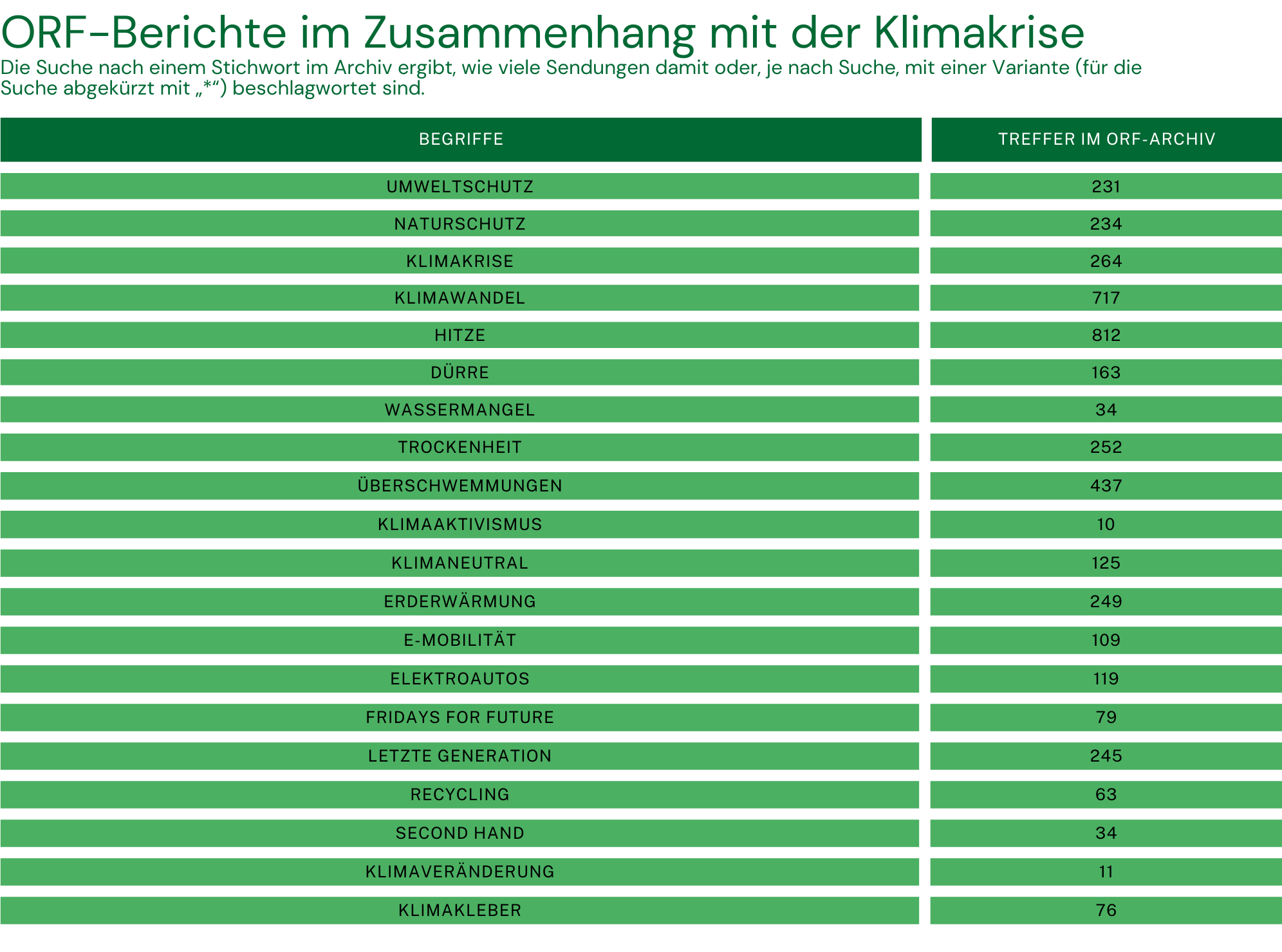73% of respondents to the Audience Council Study 2022 believe that the program mandate "to inform about nature, environmental and consumer protection and promote understanding of sustainability" is important or very important. ORF does indeed report on this topic in a variety of ways.
 But how should we talk about the climate in concrete terms - quite apart from weather forecasts in daily meteorological broadcasts? Should it be "climate change", for example, or should it be "climate crisis"? Or even "climate catastrophe"? More on this from Anita Malli, Head of Sustainability at ORF.
Which terms should be used in climate reporting is a question that many journalists have been asking themselves more and more in recent years. Internal editorial recommendations, such as those published by The Guardian in its 2019 design guidelines, are rare. Editor-in-chief Katherine Viner's reasoning behind this step: climate impacts should be taken into account. "We want to ensure that we are scientifically accurate while communicating clearly with readers on this very important topic. The term 'climate change', for example, sounds rather passive and soft when scientists talk about a catastrophe for humanity," says Viner about the British daily's move. Journalist and media manager Wolfgang Blau, who has made a name for himself worldwide as co-founder of the Oxford Climate Journalism Network, sees the dilemma that journalists are confronted with on a daily basis and suggests a different solution. His approach: "As is so often the case in journalism, a terminology dilemma like this is best solved by what is known as lexical variation - by switching between [...] terms, including global warming, global heating, climate situation, climate emergency or simply: 'the climate issue'. The word 'crisis' describes a temporary phenomenon with a beginning and an end. [...] For this reason, 'climate crisis' is not a very precise term. The point here is that climate change is such a huge phenomenon, so systemic, so unprecedented in its scale and speed, that we are already struggling to decide what to call it."
A look at Austria's media landscape shows that they tend to follow Blau's approach. "More important than a language guideline is thinking about the effects of climate change in all areas of each individual department," says Sandra Walder, head of the APA's Chronicle editorial team. She founded the news agency's climate team in 2021. At APA, as in "Der Standard", the different terms are used in parallel. Marcus Wadsak, weather editor at ORF, also uses climate crisis or terms such as "man-made global warming" in addition to climate change. Wadsak and many of his colleagues have a similar approach to the leading Austrian scientists who research and work on the subject of climate. One of them is Daniel Huppmann, a member of the CCCA, the Climate Change Center Austria, the association of Austrian climate researchers. Huppmann's research - he works for the renowned IIASA in Laxenburg - has found its way into the assessment reports of the IPCC, the International Panel on Climate Change. For Huppmann - as for ORF editor Wadsak - "climate change" is the name of the scientific discipline; in purely physical terms, it is also about a change, but it says nothing about the effects. When he talks about the effects, Huppmann uses the term "climate crisis". For example, he refers to the effects of extreme weather events in his lectures, such as the covered roof of a church after a storm, as a climate crisis. Sigrid Stagl, Professor of Environmental Economics at WU Vienna, takes a similar view. Climate crisis is the more recent term, but - as a look at databases of scientific publications confirms - it is becoming increasingly common. She herself uses the term "climate heating" in her lectures because it most closely corresponds to the effects that can already be felt - think of forest fires in Canada that even last in winter, droughts and heatwaves in Greece and Spain. But Stagl also uses the term "climate change".
There is no language rule at ORF: journalism is free. At the same time, scientific standards are taken seriously in order to provide the best possible information. In a process such as climate change, which has some economic and social winners, but above all many losers, this is a challenging task that requires knowledge about climate change and the climate crisis as well as an examination of language and images.
But how should we talk about the climate in concrete terms - quite apart from weather forecasts in daily meteorological broadcasts? Should it be "climate change", for example, or should it be "climate crisis"? Or even "climate catastrophe"? More on this from Anita Malli, Head of Sustainability at ORF.
Which terms should be used in climate reporting is a question that many journalists have been asking themselves more and more in recent years. Internal editorial recommendations, such as those published by The Guardian in its 2019 design guidelines, are rare. Editor-in-chief Katherine Viner's reasoning behind this step: climate impacts should be taken into account. "We want to ensure that we are scientifically accurate while communicating clearly with readers on this very important topic. The term 'climate change', for example, sounds rather passive and soft when scientists talk about a catastrophe for humanity," says Viner about the British daily's move. Journalist and media manager Wolfgang Blau, who has made a name for himself worldwide as co-founder of the Oxford Climate Journalism Network, sees the dilemma that journalists are confronted with on a daily basis and suggests a different solution. His approach: "As is so often the case in journalism, a terminology dilemma like this is best solved by what is known as lexical variation - by switching between [...] terms, including global warming, global heating, climate situation, climate emergency or simply: 'the climate issue'. The word 'crisis' describes a temporary phenomenon with a beginning and an end. [...] For this reason, 'climate crisis' is not a very precise term. The point here is that climate change is such a huge phenomenon, so systemic, so unprecedented in its scale and speed, that we are already struggling to decide what to call it."
A look at Austria's media landscape shows that they tend to follow Blau's approach. "More important than a language guideline is thinking about the effects of climate change in all areas of each individual department," says Sandra Walder, head of the APA's Chronicle editorial team. She founded the news agency's climate team in 2021. At APA, as in "Der Standard", the different terms are used in parallel. Marcus Wadsak, weather editor at ORF, also uses climate crisis or terms such as "man-made global warming" in addition to climate change. Wadsak and many of his colleagues have a similar approach to the leading Austrian scientists who research and work on the subject of climate. One of them is Daniel Huppmann, a member of the CCCA, the Climate Change Center Austria, the association of Austrian climate researchers. Huppmann's research - he works for the renowned IIASA in Laxenburg - has found its way into the assessment reports of the IPCC, the International Panel on Climate Change. For Huppmann - as for ORF editor Wadsak - "climate change" is the name of the scientific discipline; in purely physical terms, it is also about a change, but it says nothing about the effects. When he talks about the effects, Huppmann uses the term "climate crisis". For example, he refers to the effects of extreme weather events in his lectures, such as the covered roof of a church after a storm, as a climate crisis. Sigrid Stagl, Professor of Environmental Economics at WU Vienna, takes a similar view. Climate crisis is the more recent term, but - as a look at databases of scientific publications confirms - it is becoming increasingly common. She herself uses the term "climate heating" in her lectures because it most closely corresponds to the effects that can already be felt - think of forest fires in Canada that even last in winter, droughts and heatwaves in Greece and Spain. But Stagl also uses the term "climate change".
There is no language rule at ORF: journalism is free. At the same time, scientific standards are taken seriously in order to provide the best possible information. In a process such as climate change, which has some economic and social winners, but above all many losers, this is a challenging task that requires knowledge about climate change and the climate crisis as well as an examination of language and images.
ORF itself is the subject of sustainability reporting and regularly publishes corresponding reports here.

#socialvalue
ORF reports in connection with the climate crisis
The search in the ORF archive shows how many programs are tagged with the respective climate keyword (or a variant thereof).
Term Hits in the ORF archive 2023 Examples
Environmental protection 231 ZIB1: Transatlantic flight/ sustainable fuel, 29.11.
Nature conservation 234 Citizens' Advocate asked: Napoleonwald, 30.12.
Climate crisis 264 ZIB Magazin: Climate refugees in Europe, 25.12.
Climate change 717 Weltjournal: Life at 50 degrees, 29.11.
Heat 812 ZIB1_ warmest September 30.09.
Drought 163 Mayrs Magazin_ Wissen für alle: Heat Pakistan 24.11.
Water shortage 34 Current after 1. Israel 16.10.
Drought 252 Zib11:00_ Taylor Swift/ Drought Braslilien aktuell 19.11.
Floods 437 ZIB spezial_ Flood update, liveschaltung nach Kärnten 06.08.
Climate activism 10 In the center: feed Climate activism Last generation
Climate neutral 125 Report: Energy transition 24.10.
Global warming 249 ZIB 3. climate and tourism 22.21.
E-mobility 109 Current after 5: E-mobility 02.09.
Electric cars 119 Current after one: Burning e-cars 2.11.
Fridays for future 79 ZIB2: Climate protector/ dilemma 13.11.
Last generation 245 Good morning Österreic: Criminal investigation against "last generation" 05.12.
Recycling 63 Mayrs Magazin: Knowledge for all: Recycling 15.12.
Second hand 34 Studio 2: Top or flop: vintage fashion 27.11.
Climate change 11 Styria today: Climate change: less bird migration, migratory birds, 18.09.
Climate glue 76Diversity
In the center: Climate stickers: heroes or criminals? 10.12.
Science.ORF.at, p. 29
Total number of articles published on science.ORF.at: 1659
Sustainability:
Hits in radio archive: 93
Hits in TV archive: 1,000
Viewers of the MOTHER EARTH focus: 4 million
ORF's own productions: 8
Hits for climate crisis in the ORF archive: 136
Environment/ climate awards:
"klimaaktiv Gold" standard for all new and renovated buildings (2022/2023), eco-label for communal catering for the canteen run by Euerst at the ORF media campus (2022; see also Sustainability Report 2021/22), new audit of the ORF printing plant and award of the licensee status for the eco-label for printed products (2022), VCÖ mobility award for ORF's operational mobility management (BMM) at the Vienna locations (2022)


